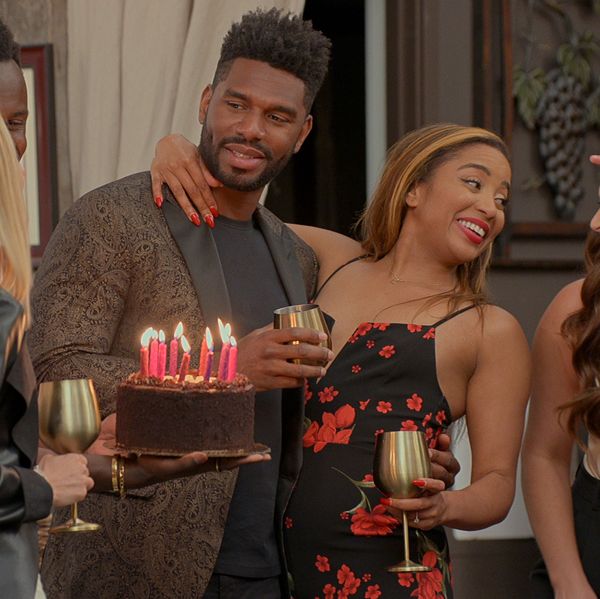
The honeymoon’s officially over, and not every couple made it out of paradise with their engagements intact. However, for the Love Is Blind Season 4 hopefuls that did, episodes 6-8 are about cultivating a love that stands the test of time and reentering the real world as husbands- and wives-to-be. In shared apartments provided by the show, the couples will learn to navigate cohabitation, work routines, finances, family and friend dynamics, and most importantly, putting in the work to eventually make the commitment of a lifetime to someone in a matter of three weeks.
In case you missed our first recaps, you can find those here and here. Keep reading for a recap of everything you missed on episodes 6-8 of Love Is Blind.
Spoilers are most definitely ahead!
Kwame + Chelsea
Kwame is doing his best to get back into my good graces, and it’s somewhat working. In episode 6, after the real-ass conversation, he and Chelsea had in Mexico, where she urged him to let the Micah ish go, Kwame seems to be walking the talk of the man that said he was where he was supposed to be in regards to his engagement with Chelsea. As he basks in the glory of doing adulting to the highest level, he seems in awe and at ease and even tells Chelsea that walking into their place together makes him feel “at home in it.”
As they are enjoying their first takeout meal in their spot together, the two begin to talk about cleaning duties and how they should go about dividing chores. Chelsea expresses that she prefers going to bed with a clean kitchen, but Kwame is more 80/30 when it comes to clean dishes. Surprisingly, he notes that he would like for Chelsea to flush the toilet after she uses the bathroom every time. Chelsea makes excuses but eventually agrees. Come on, boo. We can’t be pressed about clean dishes 100% of the time and then leave pee in the toilet for our fiancé to flush for us.
Later on in the episode, the two explore each other’s apartments in real life. I loved the backstory of the healing nature of Chelsea’s decorating decisions and how her space was one of self-expression and fulfillment of her being her full self in ways she couldn’t be in a previous relationship.
Chelsea shares with the camera that things got really real for her that day because, during her single days, she was met with a lot of loneliness. She reveals being on FaceTime calls constantly to feel some kind of connection. “Everything’s different now,” she ends tearfully. “I get to come home to Kwame. And that’s a whole new feeling for me. I’ve wanted it for so long.”
In the episode’s cliffhanger, Kwame and Chelsea learn that they both have dads named Charles, but Chelsea is nervous about how her dad Charlie will receive the news of this very unique circumstance of falling in love, getting engaged, and married in a matter of weeks. While doing her best to combat her nerves, Kwame and Chelsea have a semi-passive-aggressive back and forth about who lectures who the most before Kwame waves his white flag to share why he should be on edge more than she should be on edge.
Despite some of his anxiety around the situation, he does his best to try to assuage Chelsea in her stressful moment, but Chelsea ain’t trying to hear none of that.
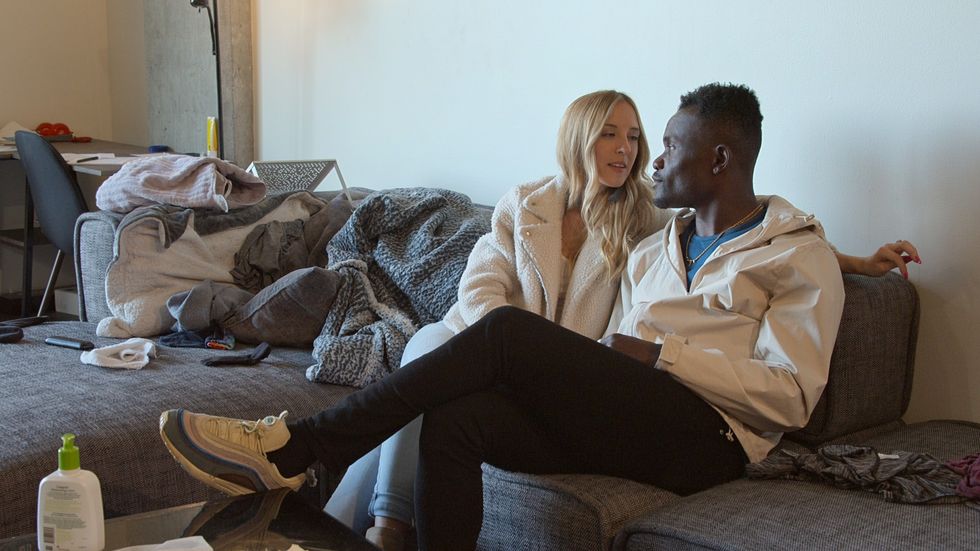
Courtesy of Netflix
As revealed at the top of episode 7, all the conversation leading up to meeting Chelsea’s dad was for naught because Charlie barely needed an explanation to get with the program. He embraced Kwame and Chelsea’s relationship with him with literal arms wide open! Later in the episode, Chelsea and Kwame head to Portland, where Kwame actually resides (not Seattle like the majority of the other cast members of the season), to visit his apartment and take some things of his to the shared apartment in order to really coexist.
It’s interesting to note that Kwame would have to uproot the life he leads in Portland to make the relationship and could-be marriage work with Chelsea. He tells the camera he has no friends in Seattle. He has things about Portland that are routines for him. Chelsea is dead set on having a life in Seattle. Kwame notes that he sometimes feels he compromises a lot, maybe too much even.
Later in the episode, when Kwame has the phone conversation with his mom about doing the experiment and moving forward with an engagement with Chelsea, the news is not received well. He tells Chelsea that his mom is a big part of his life and that it is tough to hear that she isn’t happy for him. It’s a stark contrast to the unyielding acceptance we felt from Chelsea’s dad.
Kwame seems to take things in stride, giving his super emotionally intelligent recap of the events to Chelsea, but I can’t help but think that it must be hard to always swallow your emotions and filter them in a way where you have to apply so much reason to the things you have every right to feel. He was hurt and disappointed but does his best to smile through everything. I thought that said a lot about who he strives to be in life.
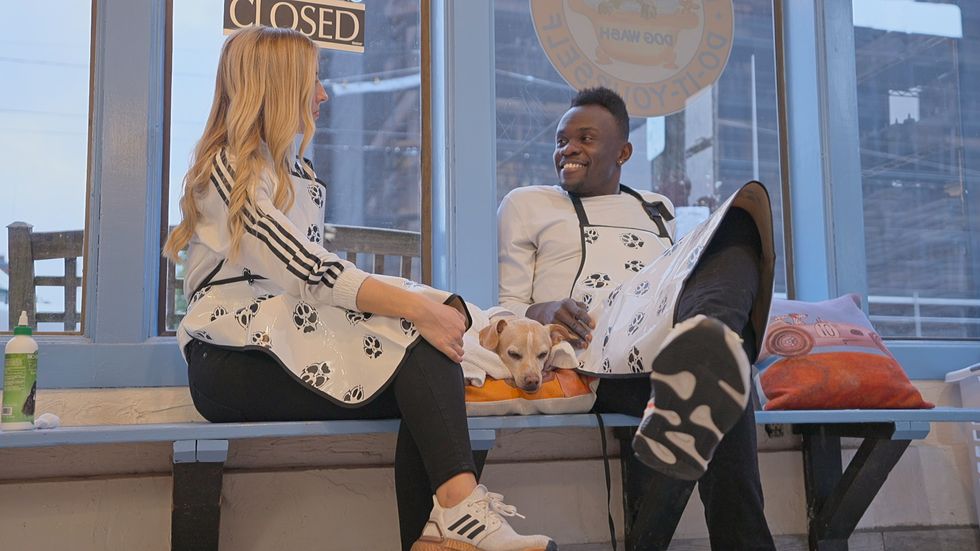
Courtesy of Netflix
In episode 8, Kwame is making major life adjustments, from moving to Seattle for Chelsea to taking care of her dog, Rocky. When they have a conversation about having a family after bathing Rocky, I appreciate the seriousness of such a topic. It seems like it’s been broached before because Chelsea leads with reminding Kwame that he said three years into being married would be a good time to start a family. The pressure is on, and you can tell as Kwame seems uneasy while Chelsea is speaking her piece about always seeing herself as a mom.
He emphasizes wanting to have time to “enjoy each other.” He notes that Rocky infringes upon their ability to be flexible as it is, even if he sees himself and his future wife traveling the world together. Kids would add another difficult layer to that desire. When she notices that it seems Kwame is grieving a past version of his life, Chelsea asks a fair and important question, “Do you want to settle down?” Thank you, someone who remembers the point of this show.
Kwame tells her that he is compromising a lot. There goes that word again. I have a feeling that is more so what it is about than having kids versus not having kids. He ends the conversation by explaining that he just wants his feelings to be considered. “Considered,” Chelsea replies.
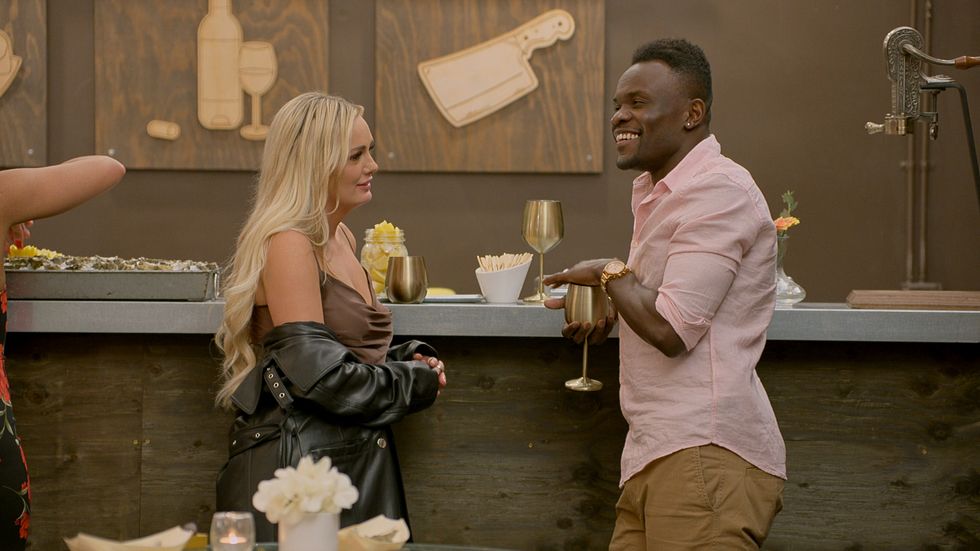
Courtesy of Netflix
As he opens up to Tiffany at Chelsea’s birthday party later in the episode, his issues with compromise and the potential of being too compromising are something that comes up again. In another inappropriate sidebar conversation with Micah, Kwame asks her if she feels she’s made the right choice. As usual, with their conversations, it feels like they are applying feelers to the situation to see if there’s smoke where there’s fire. I have my eye on these two.
He tells the camera that he will always have feelings for Micah, and he likes that their connection is “seamless,” and there’s no pressure to it. I rolled my eyes because he's not engaged to her and there are no ties, and that’s why there’s no pressure. You’re having to make these life-changing decisions about your partner in a matter of weeks. Of course, you’ll feel some pressure with Chelsea that you won’t feel with another woman not directly involved in that relationship.
The fantasy of what could be doesn’t always tell the story of what is and blatant acts of disrespect like this after the conversation he had with Chelsea about letting it go makes me feel for his fiancée. She deserves better than that.
Brett + Tiffany
The hygiene Olympics continue as Tiffany and Brett come onto the scene heading into their nighttime routine. They are sharing the bathroom while Brett brushes his teeth, shirtless, might I add (there was no need, but I felt like context would be a great addition here). Tiffany reveals to the camera that cleanliness might be an issue for them because she likes things clean, emphasis, and Brett is the type to exit the shower and leave water everywhere, which she says is a big pet peeve of hers. When she brought it up to him, he dismissed it as just being water. I mean, it does dry.
When they exit the bathroom, Tiffany tells Brett that a TV in the bedroom would be great to have. Brett disagrees and lets her know that the only thing that should have her attention in the bedroom is sleep or him. She takes that as an invitation and coquettishly replies, “My attention is on you now,” before joining him in bed. “I’m really happy here. And I really mean that,” he expresses to her as she smiles.
Later in the episode, Tiffany introduces Brett to her chosen family of friends for food and drinks. And they started with some tough questions right out the gate, feeling him out for their friend. It was also cool to learn about Tiffany being an easy sleeper from her friends because it provided some context about that infamous night sis fell asleep on Brett in the Pods. Apparently, sir passed their “tests” with flying colors.
Feeling the love from her friends and how much they wanted to see that love epitomized in her partner and how much Brett seemed to exemplify that made for a very endearing scene.
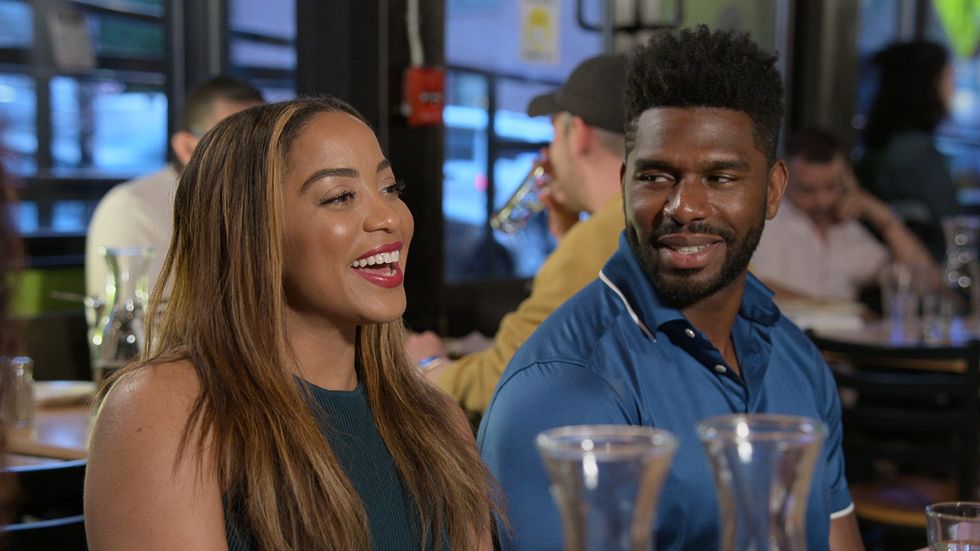
Courtesy of Netflix
In episode 7, Brett takes Tiffany to check out his apartment because if they make it to the altar, it’s where they will be living. It is there that Brett gets coined the nickname “Bougie Brett” by Tiffany, who, despite going on about how clean she is, seemed super impressed with the look and feel of Brett’s uber-neat apartment.
Space, though, quickly becomes an issue as the couple tries to figure out where will things like Tiffany’s clothes fit or even a workspace for her to work. Brett reminds her that he is willing to upgrade to a bigger apartment in the same building if she likes the apartment. “I can see myself living here,” she says to Brett eventually.
As the episode continues, Tiffany is cooking a meal for the pair, and they embark on a conversation about their approach to finances and what their lifestyle will be like after their lives have effectively merged. It was refreshing to hear these types of conversations had between a couple on this show, as I don’t think it’s shown amongst the other couples if they are having these types of convos.
Tiffany references Brett’s expensive taste as something she doesn’t necessarily want to infringe upon, but she does want the bills to be taken care of without having to monitor how much he is spending and on what. Brett adds to that by saying that he is comfortable with doing a 75-25 split or a 60-40 split on some bills. I’m like, okay here. Love to see it. Brett and Tiffany are a beautiful example of what emotional maturity looks like and being on your grown man/grown woman ish. I think this show could definitely use a lot more of that. Cast more Bretts and Tiffanys, please!
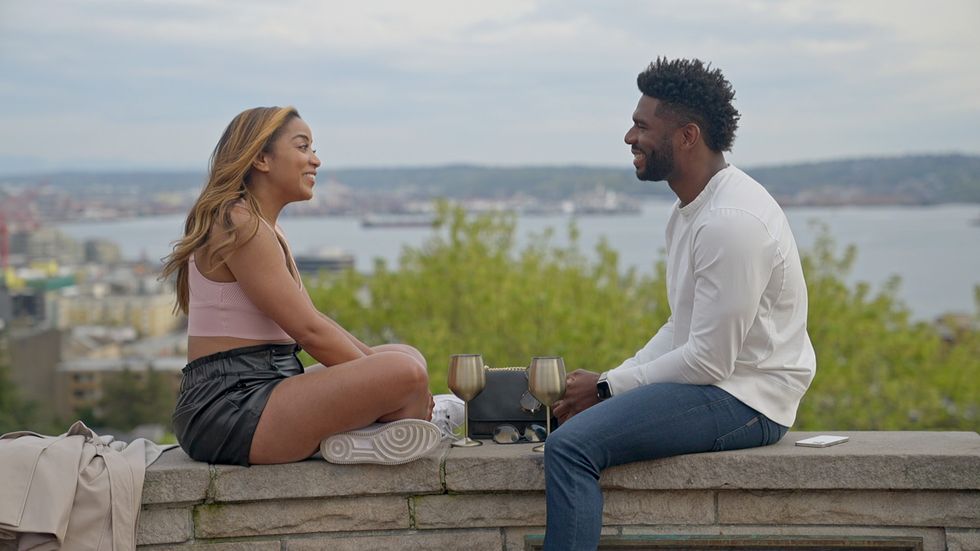
Courtesy of Netflix
Nothing of real consequence happens between the couple in episode 8, just Brett and Tiffany being adorable and expressing gratitude about having found each other to be able to do life together. That’s the thing about being a pretty solid couple on the show. There’s no need to do extensive recaps on this couple because conflict doesn’t tend to occur unhealthily.
And that's also why they are my Unproblematic Faves.
Marshall + Jackie
Marshall is a grower, not a shower, it seems, because I felt his love for Jackie beaming through the screen as he talked about the joy he found in developing a routine. I was a little lukewarm on him, but I think when he is expressing his pleasure in doing things for Jackie, his inner light is glowing, and he seems that much brighter overall. He recounts the good things about doing life with her, like waking up to her, making her breakfast before sending her to work, doing his things, and then waiting for her to get home.
While they are on the couch together talking about telling their respective families about their engagement, Marshall shares that his family is "over the moon" happy for him. However, Jackie shared that she told her mom and dad and that their response was, "This is not Jackie." She says it with a laugh and reiterates that they were so shocked and she had to tell them that she was "dead-ass." She ends the story by saying that she still doesn't think they believe her, but they will just have to come to terms with her being engaged in their own time.
Jackie notes that she has to be "up to par" when it's time to meet Marshall's folks but says that she wants to hold off on him meeting her family for as long as possible. When Marshall asks if Jackie thinks her family wants to meet him, she answers, "I would hope so," and then details how her mom and dad are.
Later in the episode, we see Marshall doing his aforementioned favorite thing, cooking breakfast for Jackie. She greets him warmly and learns he is making pancakes with a strawberry raspberry compote. Jackie is so impressed by the initiative and the effort and says excitedly, "Wow, I feel like I'm in a restaurant!" and thanks him with a kiss. "I'm so blessed," she says to him. "You are," he responds.
Jackie reveals to the camera that she has never been loved like this or experienced anything like this before. And that explains a lot of the self-sabotage vibes I got from the previous episodes. She's never been treated like this before, so she might be combatting feelings of unworthiness and doing that thing where we fuck up things that we know are good for us because somehow we've convinced ourselves we don't deserve it. Self-sabotage is a mf.
I see glimpses of the self-sabotage threaten to reemerge in episode 7, where Jackie seems very anxious about something. It is revealed that the couple is talking about meeting his family plus her family's lack of support and that Jackie is stressed out because "it is a lot." Jackie wants Marshall to give her some space to get herself together, and Marshall agrees to take a walk to give her some time. He tells the camera that Jackie has a tendency to ruminate and stay in moods for a long time but that he is able to give her the space she needs to sort through her own feelings. "I can do that for her," he explains.
Jackie eventually opens up to Marshall about her emotions and feeling like she has to make a hefty decision at the end of this experiment that will not only impact her but her relationship with her family since they are not in full support of her and Marshall. She doesn't want to hurt her family, but she also doesn't want to hurt herself in the process. Her anxiety is getting the better of her and as a result, she doesn't feel like she is at her best to meet his family.
Great news, Jackie does decide to meet his family that day despite the emotional tailspin she was in. Marshall's sister and brother-in-law come through with his niece. And the vibe completely shifts from tears to all smiles. "I need to know everything from the beginning," his sister announces as they eat together. Marshall lets his sister know how much of an impact Jackie has made on him as a creative, as a man, and as a person, and breaks down how they bonded.
Marshall's brother-in-law notes that he feels a positive shift in his aura. Jackie speaks her piece about her connection with Marshall and how he's taught her to be more grown. "Marriage is biblical. That's serious. I need to make sure I'm the best version of me before I say yeah," Jackie admits to Marshall's family. I love that Jackie said that because it emphasized her values around the commitment of marriage.
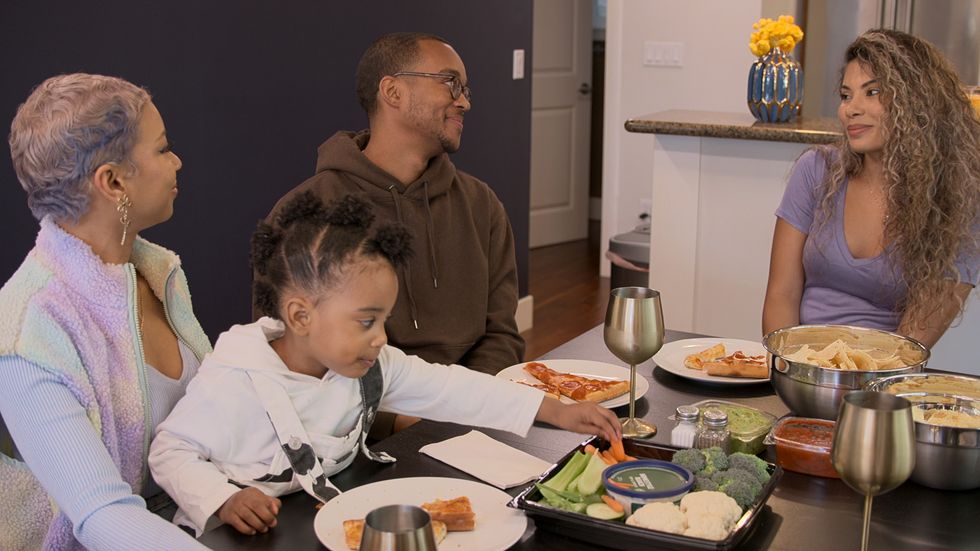
Courtesy of Netflix
I still don't see it for these two. The pieces are there, but there's something missing. They kind of remind me of another couple on the show that I don't talk much about, Paul and Micah, in these recaps. Like they're trying to get pieces to fit, but somehow, it doesn't feel organic. I don't doubt that love is there, but I do doubt this couple and that couple's staying power, especially in terms of having very real sources of conflict but being reluctant to adequately talk through the issues before they build up to be more.
Jackie is downplaying the importance of her family's support or lack thereof and can also just overall feel like a walking red flag. Micah is downplaying the fact that she wants to be able to go back and forth to her place in Arizona, and Paul isn't having any of it. Whereas I feel like Marshall has enough flexibility for a relationship with Jackie to go the distance, I do wonder if it is indeed what Jackie needs. Despite constantly reassuring the viewers and herself, how does she really feel?
In episode 8, the relationship between Marshall and Jackie officially begins to unravel. I didn't think that my concerns about them would be validated, but one argument proved to be a turning point in their relationship and would eventually lead to a point of no return. Marshall tells the camera that the relationship is looking pretty "bleak" with Jackie and that during a conversation they had while the cameras weren't rolling, Jackie told Marshall he needed to "boss up." Now, I know that's one of Jackie's favorite phrases, so I could see her saying that.
Marshall didn't take that phrase very well and heard in her choice of words that he was not "man enough." I don't know if that's what she meant, but that's what he received from her communication, which is perhaps what matters. He apparently left her to stop himself from going off and the conversation from getting too heated. When he enters the house after being gone for 2-3 days (the timeframe isn't clear), Jackie is visibly upset as she is packing.
Marshall passively aggressively questions if she's packing her stuff and why. "I'm not about to play these games with you," she says dismissively as she brushes past him. She reveals that she is upset because she wanted to be able to talk to him in his heated moment, but instead, he leaves. His leaving was a problem for her. She clarified to him that she never said he wasn't man enough for her; she requested that he be more aggressive. "We don't have sex," she says before adding, "Do something."
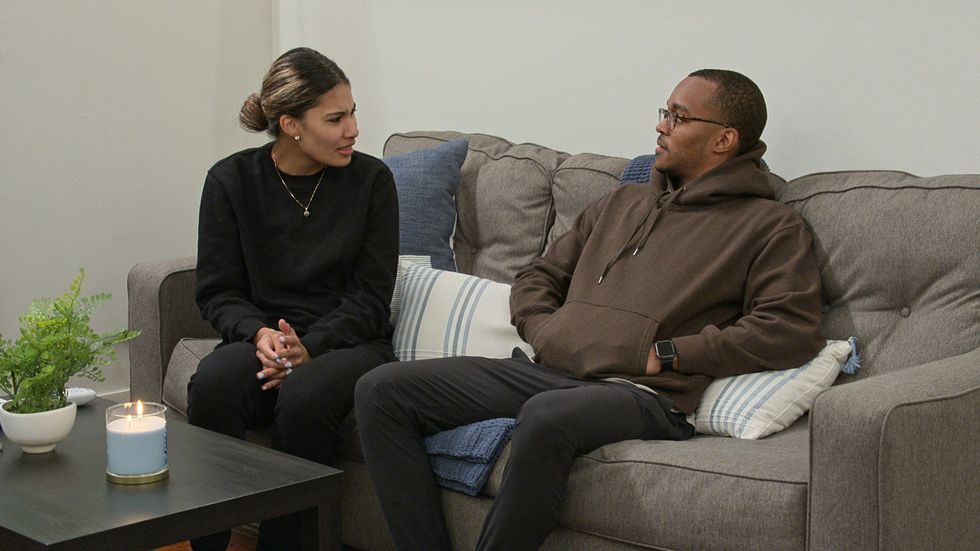
Courtesy of Netflix
Marshall counters, "It's always what you feel and how you think." Resentment. I knew it was hard having a savior complex, but he was the one who decided to take on that role. You can't be mad at the precedent you set in a dynamic. The argument that follows is so unproductive. I was shook when Marshall did a clap during the back and forth and said he was "testing" her. It's unfortunate that a miscommunication uncovered all of this with threats for both parties to leave the relationship.
Eventually, Marshall speaks his piece about putting in all the work to be the initiator of their physical intimacy, which contradicts Jackie's complaints about him not being aggressive sexually. "You have done nothing to make me feel seduced or special or anything," he tells her. "Make me feel like something, Jackie."
Jackie, of course, then asks something to the effect of why are you with me if I do nothing for you. And Marshall drops the mic when he answers very coldly, might I add, "Because I see you as a project, and I saw potential." PROJECT?!?! PROJECT?!?! I don't like Jackie like that, but I felt for her in that moment because to hear that from someone who, in the same breath, claims to love you has got to be heartbreaking.
And then he repeats the "project" talk a couple more times as if he can't see how hurtful being on the receiving end of a statement like that is. He brings it back eventually by saying it was the emotions talking and that he doesn't see her as a "project"; he sees her as having "limitless potential." It's too late, my g. For me, at least, because Jackie ends up embracing him tearfully after that back peddle. Do I think some things get said in heated situations that aren't always indicative of reality? Absolutely. But I also think sometimes truths come out when the filter and facade come down.
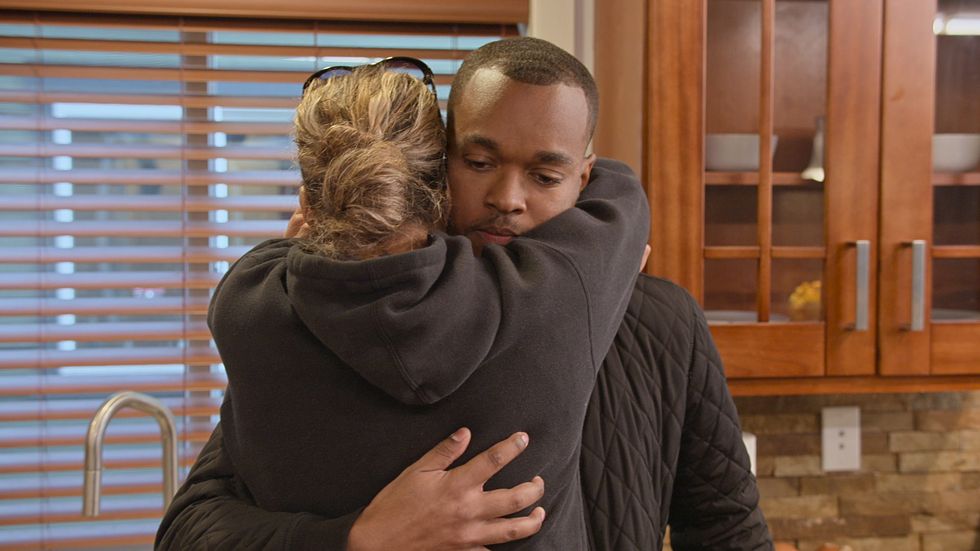
Courtesy of Netflix
With Marshall, I always wondered why he felt like he had to "save" Jackie. It turns out I got that wrong. Seeing her as a project might point to the fact that he wants to "fix" her. Jackie isn't perfect. None of us are. But it's interesting how he went from a nice guy lover boy to a puppeteer who thinks he can direct how someone is by his involvement in their lives. If someone grows from being in a relationship with you, beautiful, but it's not up to you to dictate how that comes to be. More importantly, you shouldn't look at your partner from a lens of, "If this change this, then..."
And even though I don't think he maliciously went into their romance with that at the forefront of his mind, some of what was exposed in that argument spoke volumes for how he views them. I don't care what reconciliation goes down between this couple. I stand firmly in my belief that they don't need to be together. Not right now. They both have work to do. Marshall needs to figure out why he sees partners as projects and the unhealthy cycle of that, and Jackie needs to be more ready to say "I do" ideally to a partner that she likes a little more versus tolerating them because they're "a good man."
Just in case things weren't messy enough, in true LIB fashion, an obligatory get-together happens later in episode 8 for Chelsea's birthday with couples as well as a few contestants who didn't make it out of the Pods, like Josh. Marshall arrives at Chelsea's birthday alone and says he doesn't know where he and Jackie stand.
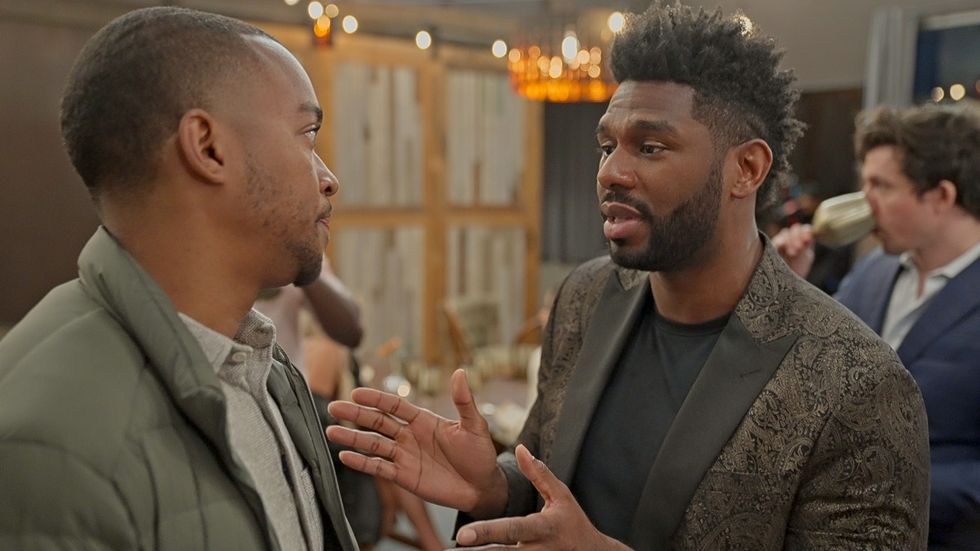
Courtesy of Netflix
He later confides with Brett that Jackie wants him to be aggressive in the bedroom, which looks like slapping her around, and that's not him. My eyes were just widening in his conversation with Brett because that's not what I got from their argument, but perhaps they had a sidebar that was too hot for TV, and that's what sis meant by "boss up" and being "aggressive." Interesting.
He also relays to Brett that Jackie tells him she "fucks with him tough" but has never said she loves him. Wow. Just wow. It's two weeks away from the wedding, and this is the type of BS this couple is navigating. Despite what they have been going through, Jackie does show up to Chelsea's birthday party. And the messiness continues.
Josh is there. If you can remember from previous episodes, Josh was one of Jackie's connections that she had Marshall tell to step. She finally gets to put a face behind the name and voice. And Josh seems dead set on making it known how he felt about Jackie, that he was in love with her, etc. Just to warn y'all, Josh also gives cringe, but somehow I see somewhat of a vibe when he is standing next to Jackie and getting her to smile with his antics.
Surely enough, Josh steps to Marshall in a drunken and passive-aggressive manner to talk to him about loving the same woman, Jackie. He refers to himself as "Mr. Steal Yo Girl," and Marshall replies half-jokingly, "If you of all people can steal her from me, you can have her." It's honestly hard to read the conversation, and even Marshall seems confused after Josh leaves him alone.
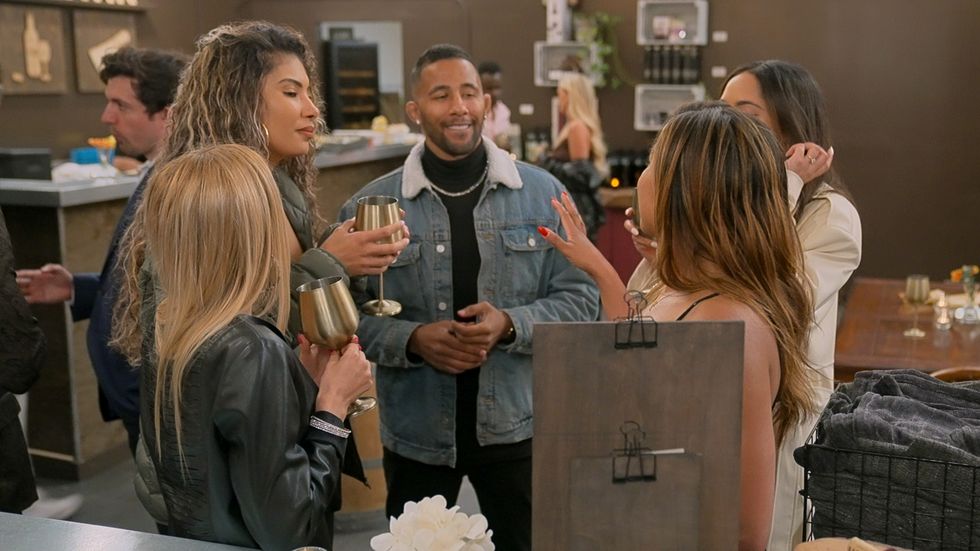
Courtesy of Netflix
Josh's liquid courage leads him to a sidebar one-on-one conversation with Jackie. Josh then takes sabotage to new heights in this series by throwing Marshall under the bus to Jackie, first calling him "NBA Cryboy" and then revealing that Marshall cried with everyone he spoke to. The Micah-Kwame poolside conversation crawled so this one between Josh and Jackie could walk. Jackie seems to really be invested in what he was saying, which is interesting because I didn't think she'd fall for it, but it seems like she might be.
She even mentions not talking about emotions with him in the Pods, which suggests to me that that might have been a reason she chose Marshall over him. Marshall wore his heart on his sleeves, while it seems Jackie might not have been sure if Josh was serious or not despite the way they vibed. "We had a connection, but you never was, like, super deep with me, super open," she explains. Daaaaaamn. All this playing in people's faces this season, I tell you.
Once Marshall becomes privy to this conversation (if he ever does), I'm sure it won't be good.
New episodes of Love Is Blind are now streaming on Netflix.
Featured image courtesy of Netflix
This Is How To Keep 'Holiday Season Stress' From Infecting Your Relationship
Hmph. Maybe it’s just me, but it seems like there is something really weird happening in the fall season air (because winter doesn’t officially begin until December 21) that cuddle season is in full swing while break-up season is as well. In fact, did you know that break-ups are so popular during the holiday season that December 11 is deemed Break-Up Day?
The reasons why relationships shift around this time vary; however, I did both roll my eyes and chuckle when I read that a very popular one is because it’s an easy way to get out of getting one’s significant other a Christmas present. SMDH.
Anyway, I personally think that the less shallow folks out here may contemplate calling things “quits” or they at least distance themselves a bit from their partner (and what I’m referring to is serious relationships) due to all of the stress and strain that oftentimes comes with the holidays whether it be financial, familial, due to their tight schedules or something else.
Listen, I would hate for you and your man to miss the fun and happiness of experiencing this time of year, all because you are so overwhelmed or irritated that you can’t really enjoy it. That’s why I have a few practical tips for how to avoid allowing the typical holiday season stress from INFECTING your relationship.
Manage Your Expectations
 Giphy
GiphyUnmanaged expectations. If there is a main reason why the holiday season tends to be so stress-filled for so many people, I’d bet good money that this is the cause. And when you’re in a long-term relationship, expectations can manifest themselves in all sorts of cryptic and/or unexpected ways. You might have relatives who assume that you are going to be with them for Thanksgiving or Christmas when you have other plans in mind. You might be thinking that you are going to spend one amount for presents while your man is thinking something totally different. When it comes to scheduling, your signals may be crossed.
And you know what? To all of these scenarios, this is where clear and consistent communication come in. Don’t assume anything. Don’t dictate anything either. From now until New Year’s, mutually decide to check in once a week, just to make sure that you are both on the same page as it relates to the holidays and what you both are thinking will come along with it. The less blindsided you both feel, the less stressed out you will be. Trust me on this.
Set (and Keep) a Budget
 Giphy
GiphyOkay, so I read that last year, 36 percent of Americans incurred some type of holiday-related debt. Hmph. Last year, there was still some sense of normalcy in this country, chile, so I can only imagine what finances are gonna look like over the next several weeks. That said, since I don’t know a lot of people who don’t find being broke stressful, make sure that you and your bae set a budget and then stick to it this year — no ifs, ands or buts.
Because really, y’all — it doesn’t make sense to deplete savings and/or max out credit cards for a few days of giggles only to be damn near losing your mind because you don’t know how to make ends meet come Dr. Martin Luther King, Jr. Day.
And by the way, this tip doesn’t just speak to things like food and gifts; I also mean travel. If it doesn’t make a ton of sense (or cents) to be all over the place this year — DON’T BE.
Keep Matthew 5:37 at the Forefront
 Giphy
GiphyIf off the top of your head, you don’t know what Matthew 5:37 says, no worries, here ya go: “But let your ‘Yes’ be ‘Yes,’ and your ‘No,’ ‘No.’ For whatever is more than these is from the evil one.” That verse right there? Oh, it’s a boundaries lifesaver! I say that because do you see “maybe” or “I’ll think about it” in there? Nope. LOL. It says that you should tell people “yes” or “no” and leave it at that — and that complements Anne Lamott’s quote, “’No’ is a complete sentence” impeccably well. Yeah, you’ve got to remember that anything beyond a yes or no to a request is privileged information; you don’t owe anyone details or an explanation.
Besides, if you are really honest with yourself, when someone asks you something and you give a “Umm, let me think about it” kind of reply, more times than not, you already know what your answer is going to be — so why not let you both off of the hook? Give your response. Commit to that. And let everyone (including yourself) get on with their lives and schedules.
I promise you that when it comes to those holiday parties, you are pissing more folks off by not RSVP’ing or doing so and not showing up than just saying, “Thank you but not this year” off the rip.
Remember That Your Personal Space Is Privilege Not a Right
 Giphy
GiphyA friend of mine recently bought a new house and invited me over to come see it. He’s a single man with no children, so as I was taking in all of the space that he had, especially as I walked through his finished basement, I joked about relatives coming to live with him. “Hell no” and “absolutely not” were pretty much his immediate responses as he went on to say that some folks even had the nerve to be offended when he told them that he had no intentions on taking DNA in.
Ain’t it wild how people think that your stuff is their right? And yes, that brings me to my next point. Your home is your sanctuary space. If you want to host folks this year — cool. If not, ALSO COOL. Please don’t let folks (family included) guilt you into how they want you to act or even into what they would do if the shoe was on the other foot. You are not them — and as one of my favorite quotes states, “If two people were exactly alike, one of them would be unnecessary.” (A man by the name Larry Dixon said that.)
Hell, my friends? They know that I am good for sending them random things that they need or even want all throughout the year. Coming over to hang out at my pace, though. Uh-uh. Chalk it up to being a card-carrying member of the ambivert club yet I like keeping my living space personal — and I sleep like a baby, each and every night, for feeling that way.
Always remember that your space, your time, your resources, your energy and shoot, yourself period (including your relationship), are all things that are your own. You get to choose how, when and why you want to share them. The holiday season is certainly no exception.
Cultivate Some “You Two Only” Traditions
 Giphy
GiphyIt’s not uncommon for some couples to hit me up after the holiday season to “detox.” Sometimes it’s due to the financial drama (and sometimes trauma) that they experienced. Sometimes it’s because they allowed their relatives (especially in-laws) to get more into their personal business than they should’ve. More than anything, though, it tends to be because they didn’t get enough quality time together and so ended up feeling “disconnected.”
Please don’t let that happen. Listen, I’m not even a holidays kind of woman and yet, I will absolutely sit myself down with some hot chocolate and chocolate chip cookies to enjoy a Hallmark holiday film or two. Aside from the fact that most of them are lighthearted and sweet, I also like that they usually focus on couples loving on each other amidst all of the holiday beauty and ambiance — which is something that all couples should set aside some time to do.
Maybe it’s a vacation. Maybe it’s a staycation. Or maybe it’s my personal favorite, A SEXCATION. Whether it’s for a few days, the weekend or even overnight — don’t you let the holidays go by without setting aside time for you and your man to celebrate one another. Don’t you dare (check out “Are You Ready To Have Some Very Merry 'Christmas Sex'?”).
GET. SOME. REST.
 Giphy
GiphyI once read that 8 out of 10 people get stressed out over the holidays and 3 out of 10 lose sleep during to it — and when you’re stress-filled and sleep-deprived, that can absolutely lead to hypersensitivity, making mountains out of molehills and even not being in the mood for sex.
Your relationship can’t afford to go through any of this, so definitely make sure to prioritize rest. I don’t care how unrealistic it might seem during this time, sleep should never be seen as a luxury; it will always and forever be a great necessity.
That said, try to get no less than six hours of shut-eye in (check out “6 Fascinating Ways Sex And Sleep Definitely Go Hand In Hand”) and even ask your bae to take a nap with you sometimes (check out “Wanna Have Some Next-Level Sex? Take A Nap, Sis.”). Not only will sleep help to restore your mind, body and spirit but, when it’s with your partner, it’s an act of intimacy that can make you both feel super connected, even in the midst of what might feel like chaos.
___
Holiday season stress is real. Still, never give it the permission or power to throw your relationship off. Put you and your man first and let the holidays be what they are gonna be, chile.
Let’s make things inbox official! Sign up for the xoNecole newsletter for love, wellness, career, and exclusive content delivered straight to your inbox.
Featured image by Shutterstock
How To Avoid Being An Emotionally Impulsive Spender This Holiday Season
Geeze. Can you believe that we are just a few days out from another Christmas? Yeah, me neither. In fact, because I’m not a holidays person myself (check out “So, What If You Don't Observe Holidays?”), it wasn’t until one of my clients was venting about how stressed out she was due to all of the holiday season procrastinating that she had been doing that I realized just how fast December is actually flying by.
If, like her, you’re feeling frazzled because, although you told yourself last year that you weren’t going to wait until the last minute to “handle your business,” you ended up doing exactly that, fret not. I’ve got 10 tips that can keep you from making emotionally-triggered decisions as far as your financial expenses are concerned. Merry Christmas. #wink
1. Create a Budget. Stick to It.
 Giphy
GiphyBudgets, boy. I recently read that one of the reasons why they don’t work for a lot of people is because many folks don’t have a clue about how much money they spend on a monthly basis to begin with. SMDH. That said, at the end of the day, it’s important to remember that a budget is simply setting boundaries/limits on your spending — and being intentional about moving in this fashion is always a wise move; especially when it comes to this time of the year…especially being that it’s typical for half of all Americans to take on some type of holiday season debt with 17 percent needing six (or more) months to pay it off.
Know what can prevent this kind of financial chaos? A SPENDING BUDGET. Tips for how to create one of your own this year can be found here.
2. Never Shop When You’re Stressed or Pressed
 Giphy
GiphyYou know how they say that it’s not a good idea to go grocery shopping when you’re hungry? Although the holiday season can be a stressful time, avoid shopping for gifts (or décor or food for recipes) when you are feeling stressed out or pressed for time. More times than not, that cultivates anxiety which could cause you to either purchase things that you don’t really want or to spend money that you don’t really have (P.S. If you’re relying on credit cards, that qualifies as money that you don’t really have. Just sayin’).
3. Don’t Keep Up with the Joneses
 Giphy
GiphyKnow something else that can stress you out: trying to keep up with the Joneses. And y’all, now that we have social media, the reality is that envy is at an all-time high. That’s because it can be really easy to watch holiday engagements, holiday trips and folks bragging about the things that they’ve received in times past, only for you to find yourself wishing that you were them — or putting pressure on yourself and those in your world to keep up.
Listen, it is King Solomon who once said, “So are the ways of everyone who is greedy for gain; It takes away the life of its owners” (Proverbs 1:19 — NKJV) and “A sound heart is life to the body, but envy is rottenness to the bones” (Proverbs 14:30 — NKJV) and he’s considered to be the wisest man who ever lived (during his time — I Kings 4:30). Yeah, both of these verses are a spiritual reminder that whatever you are planning to do or give, do it out of the goodness of your heart — not so that you can low-key “outdo” the next guy.
4. No Need to “Tit-for-Tat”
 Giphy
GiphyThis one might be a bit controversial yet I’m totally okay with that. I don’t care what the occasion is, no one is OWED a present. A gift is a voluntary token of one’s appreciation or affection. That said, if you decide to give someone a present this year, don’t automatically expect something in return. If you get something, cool. If not, if you were giving for the right reasons, it really shouldn’t matter (RIGHT?). On the flip side, if someone decides to get you something and you don’t have something to offer in return, also cool.
Other than going to someone’s home for a holiday dinner or party, for anyone to feel like they should have something in hand because someone else does…that’s not giving, that’s competing — and that absolutely should not be the spirit that you are in (or around) during this time of year.
Again, a gift is not an obligatory thing. If you’ve always thought otherwise, it’s time to do some serious reprogramming.
5. Avoid the Pressure to Buy for Lots of Adults
 Giphy
GiphyLast month, Newsweek published an article that said it’s wise to not spend a ton of money purchasing gifts for adults. A financial expert in the piece said that it’s best to buy for kids because, more times than not, you’re going to get adults something that they already have a lot of, they don’t really need or they’re not going to use (beyond maybe regifting) anyway.
If you’re not feeling that insight, my take would be to exchange names and set a price cap for the grown folks. I say that because, I don’t think that people ever outgrow wanting something over Christmas. It’s just that the over-the-top energy should be reserved for the kiddies — and even then, the “4-gift rule” (want, need, read, experience) is probably your best bet for them…financially and otherwise.
6. Go for Thoughtful over Expensive
 Giphy
GiphyIt’s kind of wild how much close-to-torture folks send themselves through to purchase gifts that, a good 6-8 months now, most folks aren’t even going to remember. That’s why it’s also a good idea to purpose in your mind to get something thoughtful over expensive.
Honestly, that’s a big part of the reason why Etsy continues to be a go-to for gifts (for every occasion) for me. It’s because you can oftentimes get things customized/personalized which ends up meaning so much more to people than something that you bought at a generic department store that might have a high price tag yet still lacks in sentimentality and deep meaning.
7. Use Coupons and Promo Codes
 Giphy
GiphyCoupons (and promo codes) are a slippery slope in the sense that…they remind me of when I used to go overboard while thrift store shopping. I say that because, just because I might find several bomb dresses for under $20, what am I going to do with 50 of ‘em (over time)? It’s just as much of a waste of money as buying couture if neither option gets much use.
And that’s kind of the thing about coupons and promo codes. Some people end up overspending because they rationalize that so long as there are discounts attached, it’s all good. At the same time, this doesn’t mean that you should forego coupons and promo codes altogether. The key is to put together your shopping list (and budget) and then use discounts specifically for those items. If you do this, you could save well over $1,000 annually (at least, depending on what you decide to buy).
8. Avoid Add-Ons
 Giphy
GiphyYeah. Dodge add-on expenses. Add-ons like what? The first thing that comes to my mind is a warranty. What’s the chance that someone is actually going to need that? Another example is paying for things to be “professionally” gift wrapped. Chile, throw that stuff in a gift bag with some tissue paper and go on about your day. All good.
9. Rethink Gift Cards
 Giphy
GiphyIf there is any time of the year when there is a noticeable hike in gift card purchases, now would be it. And although they are a convenient approach to gift giving, at the same time, many come with hidden fees, the full amount oftentimes goes unused (which ends up being a waste of money) and they do come with expiration dates that are oftentimes forgotten.
So, if you’re someone who likes to wait until the last minute to do your holiday shopping, resist the urge to impulsively pick up a handful of gift cards. Unless it’s to a place that you know someone is going to use within the next few months, they could end up in somebody’s kitchen drawer for the next couple of years. And what a waste that would be.
10. They’ll Get It When They Do. And That’s Okay.

=
GiphyOne more. Although it is super thoughtful and proactive to get people their gifts in time for whatever occasion you purchased them for, if trying to reach that goal is going to require paying for rush shipping that is damn near as high as the price of gift or spending a lot of gas money that you don’t have at the moment to drive miles and miles away — take the pressure off to spend a ton of cash just to make sure that something arrives at December 25. Listen, through doing business with Etsy, I have learned that through this administration, there are all sorts of tariff issues going on and the USPS is slower than ever too, so paying more may not guarantee much.
The hack? Send a message that something special is coming…soon enough. The thought really is what counts (more times than not); plus, it builds anticipation of something good coming, even if it’s after all of the Christmas Day hoopla. And no one (with sense) is going to have a problem with that.
Now don’t you feel better? Happy Holiday Shopping, sis.
Let’s make things inbox official! Sign up for the xoNecole newsletter for love, wellness, career, and exclusive content delivered straight to your inbox.
Featured image by Shutterstock









